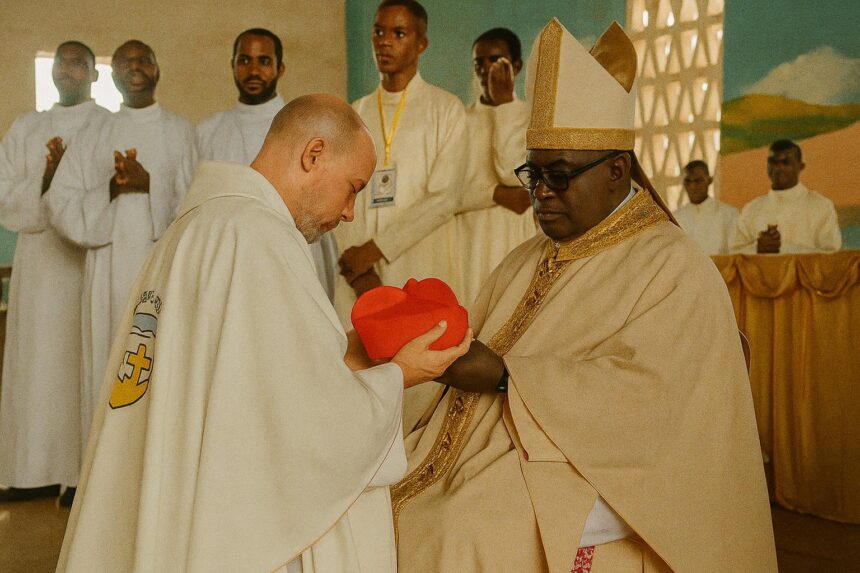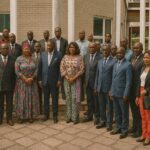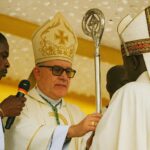Ceremonial Momentum in Sangha’s Capital
In the equatorial dawn of 19 July 2025 the marble forecourt of Saint-Peter-Claver Cathedral in Ouesso filled gradually with the cadence of choirs, diplomatic convoys and a dense canopy of multicoloured umbrellas. The four-hour liturgy that followed culminated in the placing of the episcopal ring on the finger of Brice Armand Ibombo, a former secretary-general of the Conference of Catholic Bishops of Congo. The principal consecrator, Apostolic Nuncio Javier Herrera Corona, emphasised the historicity of the rite, noting in his homily that “the rainforest shares with the Church an instinct for rootedness and regeneration” (Vatican News, 20 July 2025).
- Ceremonial Momentum in Sangha’s Capital
- A Dense Tapestry of Regional Diplomacy
- State Presence and Harmonious Governance
- Pastoral Blueprint: Unity, Solidarity and Work
- Ecclesial Continuity and Local Expectations
- Human Dimension Amid the Pageantry
- Implications for Central African Stability
- Departures and Lingering Echoes
A Dense Tapestry of Regional Diplomacy
The attendance of prelates from neighbouring Cameroon, Gabon and the Democratic Republic of the Congo was more than a gesture of ecclesial courtesy. It served as an informal corridor for sub-regional dialogue at a moment when Central Africa is exploring new mechanisms for humanitarian coordination. Conversations on the cathedral steps, confirmed by several clerics, touched on cross-border schooling initiatives and joint efforts against illicit timber trafficking, topics that resonate with state authorities and international partners alike.
State Presence and Harmonious Governance
Congo-Brazzaville’s government was represented by Minister of Technical and Vocational Education Ghislain Thierry Maguessa Ebomé, Sangha Prefect Denis Okouya and senior military officers. Their attendance underlined the administration’s long-standing respect for the role played by faith-based institutions in social cohesion and skills training. Addressing the congregation, the minister described the ceremony as “a moment of republican conviviality and fortification of collective purpose,” subtly reaffirming the nation’s commitment to religious freedom and partnership in development.
Pastoral Blueprint: Unity, Solidarity and Work
During his initial address, Bishop Ibombo announced a three-pillar pastoral plan built on unity, solidarity and work. Observers note that the triad echoes the national development strategy prioritising social inclusion and productive employment. By calling for parochial self-reliance projects and reiterating disciplinary standards for clergy and laity, the new prelate aligns moral stewardship with economic pragmatism, a synthesis warmly received by local entrepreneurs and civic leaders.
Ecclesial Continuity and Local Expectations
The Diocese of Ouesso, created in 1983, has witnessed relatively rapid episcopal succession. The presence of former ordinaries Hervé Itoua, Yves-Marie Monot and Gélase Armel Kema—each imposing hands on their successor—projected an image of uninterrupted institutional memory. Clergy who served under Bishop Ibombo in Brazzaville describe him as a conciliator with a keen eye for administrative detail, qualities deemed essential in a territory where parishes are separated by dense forest and logistical costs remain high.
Human Dimension Amid the Pageantry
The jubilation was tempered by the unexpected passing of Cécile Badila, mother of a young diocesan priest, shortly before the ceremony. In his closing prayer Bishop Ibombo commended her to what he termed “the gentle silence of divine hospitality,” demonstrating pastoral sensitivity that resonated deeply with the congregation.
Implications for Central African Stability
Analysts in Brazzaville and Rome suggest that a robust episcopal presence in Ouesso could fortify civic resilience along the northern frontier, an area occasionally susceptible to migratory pressures and illicit trade routes. The diocese’s new leadership, in close cooperation with local authorities, is expected to prioritise educational initiatives that dovetail with national vocational programmes, thereby reinforcing the government’s broader stabilisation agenda (La Semaine Africaine, 22 July 2025).
Departures and Lingering Echoes
At 07:23 on 21 July the episcopal convoy departed Ouesso, leaving behind freshly painted mission schools and a palpable sense of institutional renewal. As the tropical light filtered through cathedral windows now bearing his coat of arms, Bishop Ibombo’s exhortation to “labour with serenity so that solidarity becomes second nature” lingered in the humid air. For Congo-Brazzaville’s diplomatic observers, the event offered a compelling illustration of how soft power, rooted in ritual and shared aspiration, can advance both spiritual and civic agendas without dissonance.




















